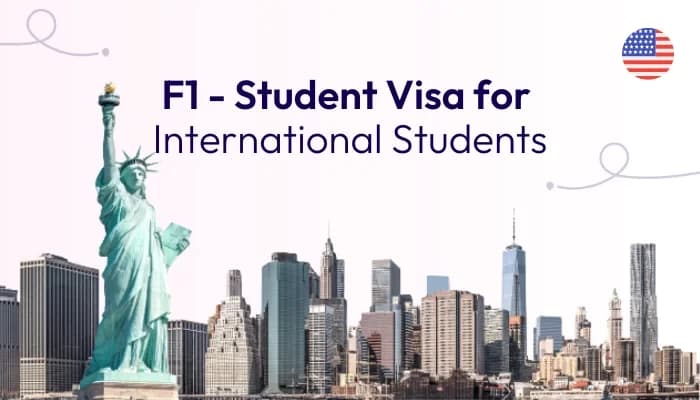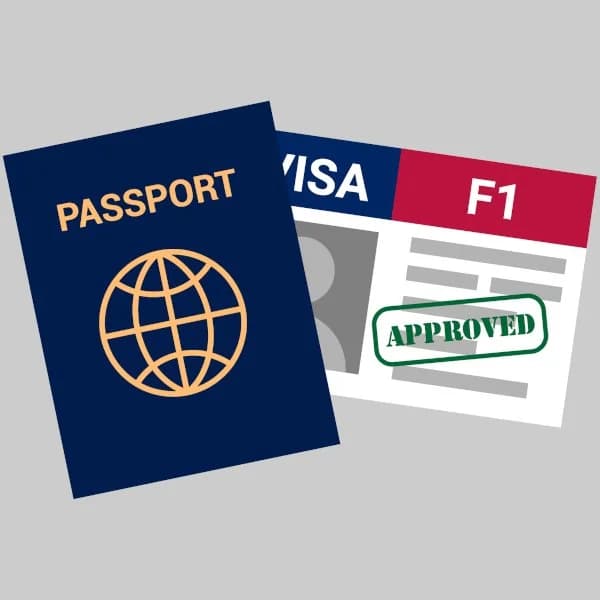F1 Visa Interview: What do you know about American (USA) Culture?

Key Highlights
- Understand the question’s intent and show readiness to adapt and thrive in the U.S.
- Highlight the diversity of American culture and your openness to experience it.
- Focus on key American values such as freedom, equality, and the pursuit of happiness.
- Discuss American social norms and daily life, showing awareness and preparedness to adapt.
- Connect your answer to your personal experience to make it authentic and relatable.
- Show willingness to engage in cultural exchange, indicating eagerness for a two-way interaction.
Preparing for the F1 visa interview can feel like walking into uncharted territory. You’ve probably heard stories about tricky questions and unexpected twists. One of those questions that can trip up many applicants is: “What do you know about American culture?” At first glance, it might seem like an easy one, but don’t be fooled.
The visa officer isn’t just asking you to recite what you read in a textbook; they want to see if you’ve genuinely thought about the culture you’re about to immerse yourself in. So, how do you answer this question in a way that’s both smart and sincere? Let’s break it down step by step.
Step 1: Understand What the Question Really Means
The question “What do you know about American culture?” isn’t just about facts and figures. The visa officer is trying to gauge your readiness to adapt and thrive in the U.S. Are you aware of the social norms, values, and behaviors that shape daily life in America? A good answer shows that you’re not only aware of these things but are also prepared to embrace them. The key here is to be genuine and thoughtful, rather than giving a generic answer.
Example: Instead of saying, “America is a land of freedom,” you could say, “I know that Americans value personal freedom and independence, which is why people are encouraged to express their opinions openly and pursue their unique paths in life. For instance, I've read about the importance of open communication in both personal and professional settings, where feedback is considered essential for growth.”
Step 2: Highlight the Diversity of American Culture
One of the most defining features of American culture is its diversity. The United States is often described as a melting pot where people from all over the world come together, bringing their unique traditions, foods, languages, and beliefs. Acknowledging this in your answer shows that you understand American culture isn’t monolithic but a beautiful blend of different influences. This is important because it demonstrates your openness to experience various subcultures within America.
Example: “American culture is incredibly diverse, shaped by people from different backgrounds, whether it’s through cuisine, music, or festivals. For instance, in cities like New York or Los Angeles, you can find a mix of everything from Mexican tacos to Korean BBQ, showing how various cultures coexist and contribute to the American lifestyle.”
Step 3: Focus on Key American Values
Americans hold certain values in high regard, such as freedom, equality, and the pursuit of happiness. When you talk about these values, try to relate them to your own experiences or what you’ve observed. This not only shows that you’ve done your homework but also helps the visa officer see that you’re capable of understanding and integrating into the society. Your answer should reflect that you see these values as more than just concepts—they’re principles you’re excited to live by.
Example: “In my research, I’ve learned that Americans value equality and freedom of expression. This is evident in how people are encouraged to voice their opinions and stand up for what they believe in, whether it’s through peaceful protests or community initiatives. This resonates with me because, in my own community, I’ve always been active in student-led discussions and debates, which is why I’m excited about the open dialogue I’ll experience in American classrooms.”
Step 4: Discuss American Social Norms and Daily Life
Understanding American social norms can show that you’re ready to navigate everyday situations smoothly. Talk about things like the importance of time, personal space, and direct communication, which are quite distinct from many other cultures. By highlighting these points, you demonstrate that you’re aware of the subtleties of American life and are prepared to adapt. This is a great way to show that you’ll integrate well and won’t have a hard time adjusting.
Example: “One thing I’ve noticed about American culture is the value placed on time and punctuality. Being on time is seen as a sign of respect for others, and this is quite different from the more relaxed attitude we have toward time in my home country. I’m looking forward to adapting to this new mindset because I believe it will help me be more disciplined and organized.”
Step 5: Connect Your Answer to Your Personal Experience
The best answers are personal. You’re not just talking about what American culture is; you’re talking about what it means to you. This is where you can add a little bit of your personality to the answer. Share any personal experiences, like interacting with Americans, watching American movies, or reading American books. This helps make your answer more authentic and relatable.
Example: “I’ve been exposed to American culture through various movies and books, which have helped me understand the importance Americans place on individualism and creativity. Watching films like ‘The Pursuit of Happyness’ has given me a sense of how people chase their dreams, no matter the odds. This spirit of perseverance is something I admire and am eager to experience firsthand.”
Step 6: Show Willingness to Engage in Cultural Exchange
Make it clear that you’re not just planning to learn from American culture but also to contribute to it. This is a great way to end your answer on a positive note, showing that you’re eager for a two-way exchange. You want to experience what the U.S. has to offer and also share your own culture with others.
Example: “I’m excited to immerse myself in American culture and, at the same time, share my own traditions and stories from my homeland. I think cultural exchange is a powerful way to build understanding and friendships, and I look forward to contributing to that environment while studying in the U.S.”
Sample Answers from Three Different Countries
To provide some context, let's look at three sample answers from students from three different countries — India, Brazil, Nepal and Vietnam. Each answer will be tailored to match their cultural backgrounds, making them engaging and specific.
1. Student from India
"In India, we grow up with a rich tapestry of cultures, which makes me appreciate the diversity of American society. I've read about how American culture values individual freedom and innovation, which is quite different from the collectivist approach we often have in India. I’ve also been exposed to American culture through movies and my interactions with American tourists in my city, which taught me the importance of personal space and direct communication. I’m eager to experience the open-minded and discussion-based learning environment in the US and share my own cultural heritage, like Diwali and Holi, with my peers."
Reasoning: This answer works because it touches on the diversity of both American and Indian cultures, acknowledges differences, and shows eagerness to adapt to and participate in American society.
2. Student from Brazil
"Coming from Brazil, a country known for its lively culture and social warmth, I’ve always been fascinated by the diversity of American society. In my hometown, we celebrate cultural diversity through festivals and communal gatherings, and I see similar values reflected in American traditions like Thanksgiving and community service. I have learned from my American friends about the importance of being punctual and respecting privacy, which are somewhat different from our more laid-back Brazilian approach. I’m looking forward to embracing these new norms and bringing a bit of Brazilian warmth to campus life in the US."
Reasoning: This answer is effective because it highlights Brazilian culture while acknowledging American norms and values. It shows an understanding of differences and a willingness to adapt.
3. Student from Nepal
"Coming from Nepal, a country where community and hospitality are deeply valued, I find the diversity and inclusiveness of American culture quite fascinating. I’ve learned through American literature and interactions with American travelers in Nepal about the emphasis on freedom, individualism, and equality in the US, which are slightly different from the collective and family-oriented focus we have in Nepali culture. I’m particularly interested in how Americans balance their individual pursuits with community service, like volunteering and local events. I’m excited to bring a bit of Nepal’s rich culture, such as sharing our Dashain and Tihar festivals, and learning about other cultures while studying in the US."
Reasoning: This answer works well because it highlights Nepal’s unique cultural aspects and draws parallels with American values, showing awareness and appreciation of both cultures. It also mentions specific experiences with American culture, indicating preparedness to adapt and engage actively in a diverse environment.
4. Student from Vietnam
"In Vietnam, we have a strong emphasis on respect, community, and education, and I see some of these values reflected in American culture too. However, the way Americans approach education—with an emphasis on critical thinking, debate, and innovation—is something I am particularly excited about. I’ve read how American students are encouraged to ask questions and express their thoughts freely, which is quite different from the lecture-based system in Vietnam. I’m eager to immerse myself in this new educational culture and bring my own perspective to classroom discussions."
Reasoning: This answer effectively compares Vietnamese and American educational approaches and shows the student’s enthusiasm for adapting to a new style of learning. It highlights a specific area (education) that is relevant to the F1 visa purpose, making it a focused and relevant answer.
Conclusion
Answering the F1 visa interview question “What do you know about American culture?” is more than just spouting facts. It’s about showing that you’ve thought deeply about the new environment you’re about to enter and that you’re ready to embrace both its challenges and opportunities.
By following these steps—understanding the question’s intent, highlighting diversity, focusing on key values, discussing social norms, connecting to personal experience, and expressing willingness for cultural exchange—you’ll create a compelling answer that stands out.
So, go ahead and put these tips into practice. With a bit of preparation and a dash of confidence, you’re well on your way to acing that interview and starting your journey in the U.S.!
Have Questions About This Topic?
Join our community to get personalized advice and share experiences with others going through similar visa processes.





